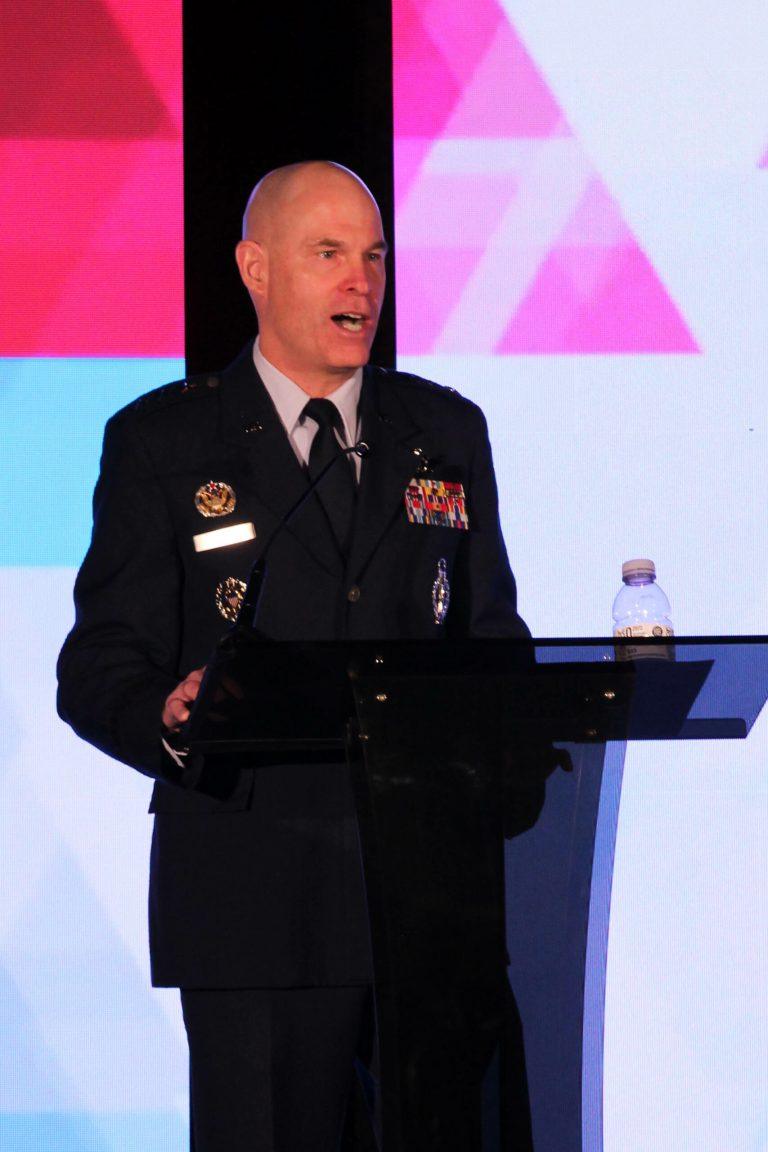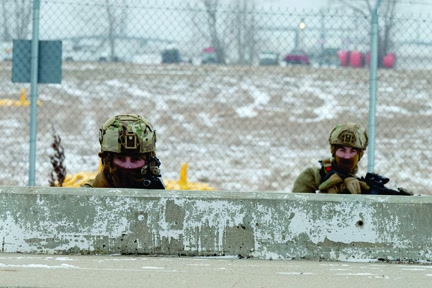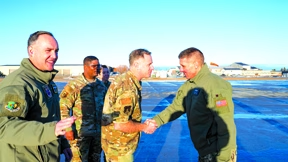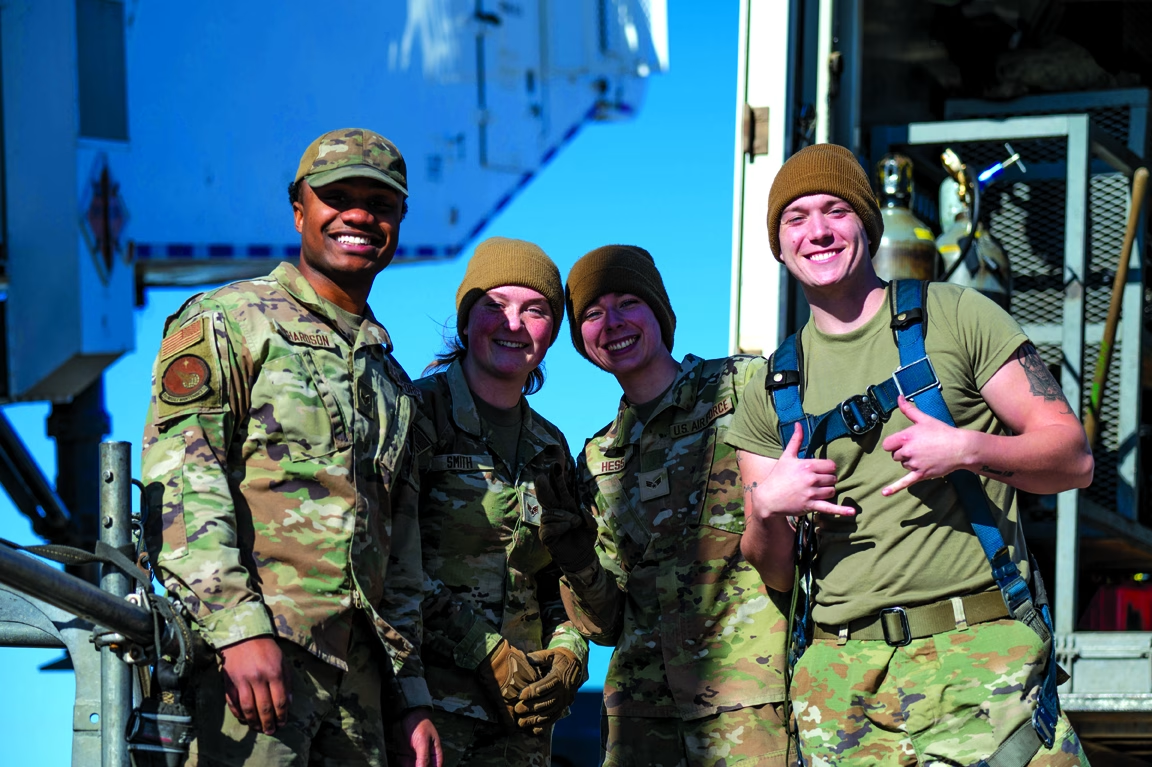Minot Area Chamber EDC (MACEDC) Task Force 21 presented the first North Dakota Nuclear Triad Symposium to over 200 attendees at the Clarion Event Center in Minot on April 23. Local and national military leaders, experts, and government officials spoke about the importance of nuclear modernization, educated community members on nuclear deterrence, and discussed the effects it has on the United States’ adversaries at the half-day event.
After an introduction by MACEDC President | CEO Brekka Kramer and Minot’s Mayor and Task Force 21 member Tom Ross, the symposium’s keynote speaker kicked off the event. Career space and missile officer Lt. Gen. Michael J. Lutton, Deputy Commander, Air Force Global Strike Command (AFGSC) and Deputy Commander, Air Forces Strategic-Air, U.S. Strategic Command, Barksdale Air Force Base, Louisiana, delivered a briefing on Air Force Global Strike Command.
“It is critical to remember that when we deliver deterrence and long- range strike capability that we do not have allies and partners with ballistic missile forces or long-range bombers.” says Gen. Lutton. “We provide that unique capability in Air Force Strike Command to not only our nation but also all of those allies and partners.
That capability is no more evident than at Minot Air Force Base.”Lt. Gen. Lutton also emphasized the influence of Minot Air Force Base as the only military installation that supports two legs of the nuclear triad. “Minot has a national level responsibility. Minot has a national level mission and if you want to feel that you just need to walk into those gates. There’s no greater importance to nuclear capabilities than Minot Air Force Base. There’s no place our adversaries can go, there’s no place that they can hide that we can’t go.”
Following the keynote address, an overview of “America’s Strategic Posture: The Final Report of the Congressional Commission on the Strategic Posture of the United States,” was presented by Bill Chambers, Maj. Gen. United States Air Force (retired), Commission Executive Director, Institute for Defense Analyses. This report is important as it highlights strategic challenges facing the country that require urgent action, and studies our adversaries while suggesting changes that will address their threats.
The National Defense Industrial Association (NDIA) President & CEO Hon. David L. Nordquist addressed our adversaries. The NDIA Northern Tier Chapter, which includes the states of North Dakota, South Dakota, Montana, Wyoming, and Minnesota, is an event partner who presented briefings on China and Russia. James P. (Phil) Wisecup, Vice Admiral, US Navy (retired) spoke on China, and Dr. Anna Batta, Associate Professor of International Security Studies Air War College at Maxwell Air Force Base, is an expert that spoke about Russia.
U.S. Representative Kelly Armstrong and North Dakota Governor Doug Burgum discussed their perspective about the importance of nuclear modernization and the role North Dakota and its military installations play in protecting the nation. U.S. Senator Kevin Cramer and U.S. Senator John Hoeven also shared their thoughts virtually through a pre-recorded address.
“The missions that we talk about here matter not just to the City of MInot, the State of North Dakota, but actually to the entire world.” says Gov. Doug Burgum. “We know that when we’re strong as a nation that’s how we achieve peace, that’s always been how it works.”
Col. Tytonia S. Moore, Deputy Director of Intercontinental Ballistic Missile Modernization, Site Activation Task Force spoke about the modernization and implementation of the Sentinel project. Sentinel is the weapon system to replace the aging Minuteman III intercontinental ballistic missile (ICBM) system, representing the modernization of the land-based leg of the U.S. nuclear triad. What makes Sentinel unique is the off-base construction and footprint it covers, including 15 missile alert facilities and 150 launch facilities.
“The current strategy of record for the Sentinel Program is we will use as much of the Minuteman III infrastructure as we can.” explains Col. Moore.
Task Force 21 Chair Mark J. Jantzer finished off the event with closing remarks. “Thank you to the Task Force 21 members, the Minot Area Chamber EDC staff for providing this opportunity for us to educate and advocate for our airmen.” says Mark Jantzer. “Today we had a look at the world situation with China and Russia and where we fit in it as a community.”
Task Force 21 will host their second nuclear triad symposium for 2024 in Washington, D.C. on September 20.
More information can be found at TaskForce21.com or by contacting the Minot Area Chamber EDC at 701-852- 6000 or minot@minotchamberedc.com.














